BMW 5 Series Touring vs Mercedes EQS SUV – Performance, range & efficiency compared
Everyday use, family trips or long-distance drives – here’s where the differences show.
Discover whether BMW 5 Series Touring or Mercedes EQS SUV fits your lifestyle better.
Here’s where it gets real: The technical differences in detail
Costs and Efficiency: When it comes to price and running costs, the biggest differences usually appear. This is often where you see which car fits your budget better in the long run.
BMW 5 Series Touring has a strongly advantage in terms of price – it starts at 52500 £, while the Mercedes EQS SUV costs 95000 £. That’s a price difference of around 42430 £.
As for range, the Mercedes EQS SUV performs strongly better – achieving up to 695 km, about 598 km more than the BMW 5 Series Touring.
Engine and Performance: Under the bonnet, it becomes clear which model is tuned for sportiness and which one takes the lead when you hit the accelerator.
When it comes to engine power, the BMW 5 Series Touring has a hardly any edge – offering 727 HP compared to 658 HP. That’s roughly 69 HP more horsepower.
In acceleration from 0 to 100 km/h, the BMW 5 Series Touring is clearly quicker – completing the sprint in 3.60 s, while the Mercedes EQS SUV takes 4.40 s. That’s about 0.80 s faster.
In terms of top speed, the BMW 5 Series Touring performs a bit better – reaching 250 km/h, while the Mercedes EQS SUV tops out at 210 km/h. The difference is around 40 km/h.
There’s also a difference in torque: the BMW 5 Series Touring pulls barely noticeable stronger with 1000 Nm compared to 950 Nm. That’s about 50 Nm difference.
Space and Everyday Use: Cabin size, boot volume and payload all play a role in everyday practicality. Here, comfort and flexibility make the difference.
Both vehicles offer seating for 5 people.
In curb weight, the BMW 5 Series Touring is decisively lighter – 1850 kg compared to 2695 kg. The difference is around 845 kg.
In terms of boot space, the Mercedes EQS SUV offers slightly more room – 645 L compared to 570 L. That’s a difference of about 75 L.
In maximum load capacity, the Mercedes EQS SUV performs somewhat better – up to 2100 L, which is about 400 L more than the BMW 5 Series Touring.
When it comes to payload, BMW 5 Series Touring minimal takes the win – 620 kg compared to 570 kg. That’s a difference of about 50 kg.
All in all, the Mercedes EQS SUV shows itself to be only slightly ahead and secures the title of DriveDuel Champion.
It impresses with the more balanced overall package and proves to be the more versatile companion for everyday use.
BMW 5 Series Touring
The BMW 5 Series Touring combines elegance and practicality, offering a luxurious interior with ample luggage space, ideal for long journeys. Its sleek design and advanced technology make it a standout in its class, delivering a blend of performance and comfort. With its smooth handling and efficient engine, this vehicle is perfect for both city driving and countryside adventures.
details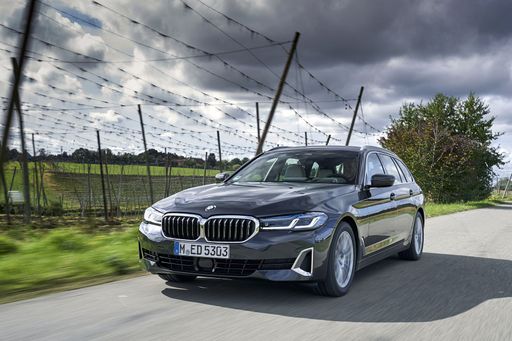 @ press.bmwgroup.com
@ press.bmwgroup.com
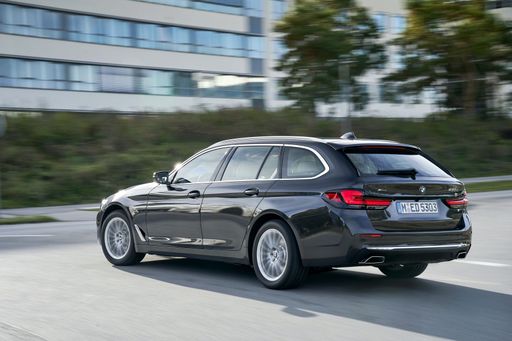 @ press.bmwgroup.com
@ press.bmwgroup.com
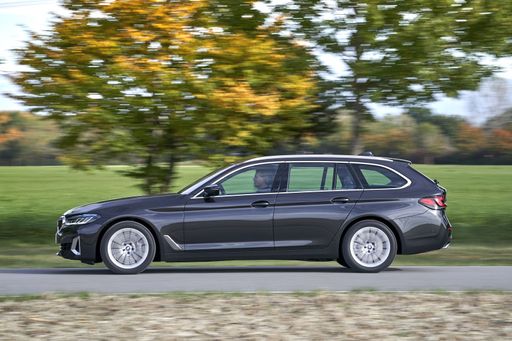 @ press.bmwgroup.com
@ press.bmwgroup.com
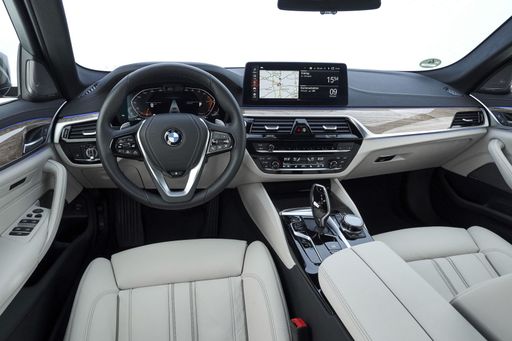 @ press.bmwgroup.com
@ press.bmwgroup.com
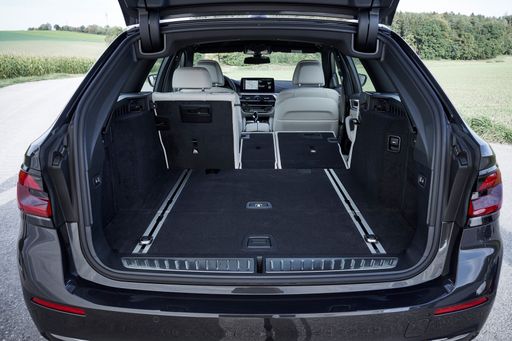 @ press.bmwgroup.com
@ press.bmwgroup.com
Mercedes EQS SUV
The Mercedes-Benz EQS SUV redefines luxury in the electric vehicle segment with its elegant design and cutting-edge technology. Its spacious interior provides exceptional comfort, featuring high-quality materials and innovative ambient lighting to create a serene driving environment. This SUV impressively combines sustainability with performance, offering a smooth and quiet ride without compromising on power.
details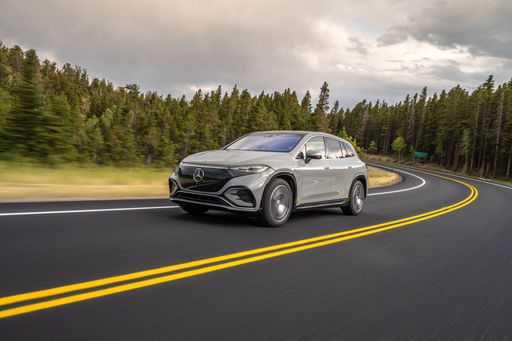 @ group-media.mercedes-benz.com
@ group-media.mercedes-benz.com
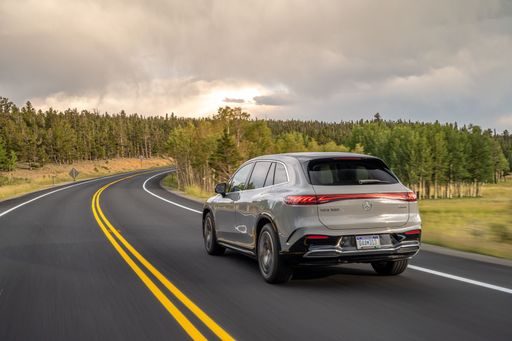 @ group-media.mercedes-benz.com
@ group-media.mercedes-benz.com
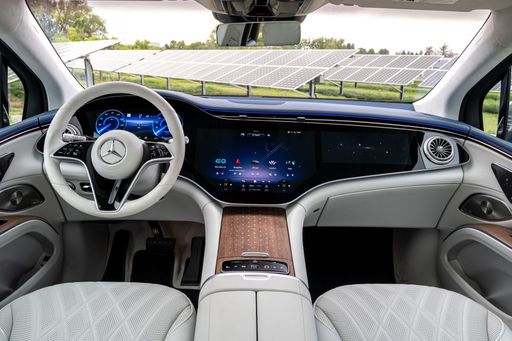 @ group-media.mercedes-benz.com
@ group-media.mercedes-benz.com
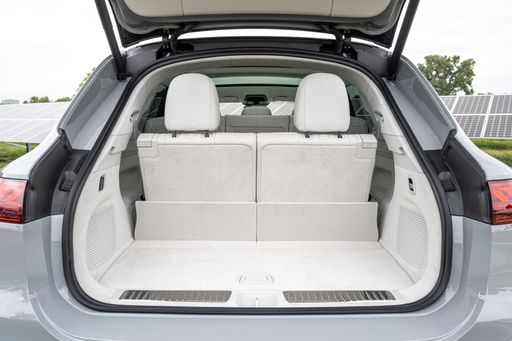 @ group-media.mercedes-benz.com
@ group-media.mercedes-benz.com

|

|
|
|
|
Costs and Consumption |
|
|---|---|
|
Price
52500 - 125500 £
|
Price
95000 - 212100 £
|
|
Consumption L/100km
0.7 - 6.1 L
|
Consumption L/100km
-
|
|
Consumption kWh/100km
-
|
Consumption kWh/100km
19.6 - 21.9 kWh
|
|
Electric Range
66 - 97 km
|
Electric Range
615 - 695 km
|
|
Battery Capacity
18.6 - 19.4 kWh
|
Battery Capacity
108.4 - 118 kWh
|
|
co2
16 - 157 g/km
|
co2
0 g/km
|
|
Fuel tank capacity
60 L
|
Fuel tank capacity
-
|
Dimensions and Body |
|
|---|---|
|
Body Type
Estate
|
Body Type
SUV
|
|
Seats
5
|
Seats
4 - 5
|
|
Doors
5
|
Doors
5
|
|
Curb weight
1850 - 2550 kg
|
Curb weight
2695 - 3075 kg
|
|
Trunk capacity
500 - 570 L
|
Trunk capacity
440 - 645 L
|
|
Length
5060 - 5096 mm
|
Length
5125 mm
|
|
Width
1900 - 1970 mm
|
Width
1959 - 2034 mm
|
|
Height
1515 - 1516 mm
|
Height
1718 - 1721 mm
|
|
Max trunk capacity
1630 - 1700 L
|
Max trunk capacity
2100 L
|
|
Payload
500 - 620 kg
|
Payload
425 - 570 kg
|
Engine and Performance |
|
|---|---|
|
Engine Type
Plugin Hybrid, Diesel MHEV, Petrol MHEV
|
Engine Type
Electric
|
|
Transmission
Automatic
|
Transmission
Automatic
|
|
Transmission Detail
Automatic Gearbox
|
Transmission Detail
Reduction Gearbox
|
|
Drive Type
All-Wheel Drive, Rear-Wheel Drive
|
Drive Type
All-Wheel Drive, Rear-Wheel Drive
|
|
Power HP
197 - 727 HP
|
Power HP
360 - 658 HP
|
|
Acceleration 0-100km/h
3.6 - 7.5 s
|
Acceleration 0-100km/h
4.4 - 6.8 s
|
|
Max Speed
218 - 250 km/h
|
Max Speed
210 km/h
|
|
Torque
330 - 1000 Nm
|
Torque
568 - 950 Nm
|
|
Number of Cylinders
4 - 8
|
Number of Cylinders
-
|
|
Power kW
145 - 535 kW
|
Power kW
265 - 484 kW
|
|
Engine capacity
1995 - 4395 cm3
|
Engine capacity
-
|
General |
|
|---|---|
|
Model Year
2024 - 2025
|
Model Year
2024
|
|
CO2 Efficiency Class
B, E, F
|
CO2 Efficiency Class
A
|
|
Brand
BMW
|
Brand
Mercedes-Benz
|
What drivetrain options does the BMW 5 Series Touring have?
The BMW 5 Series Touring is available as All-Wheel Drive or Rear-Wheel Drive.
The prices and data displayed are estimates based on German list prices and may vary by country. This information is not legally binding.
